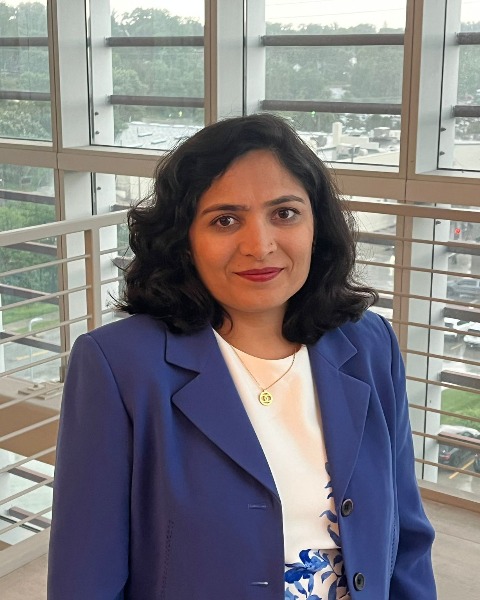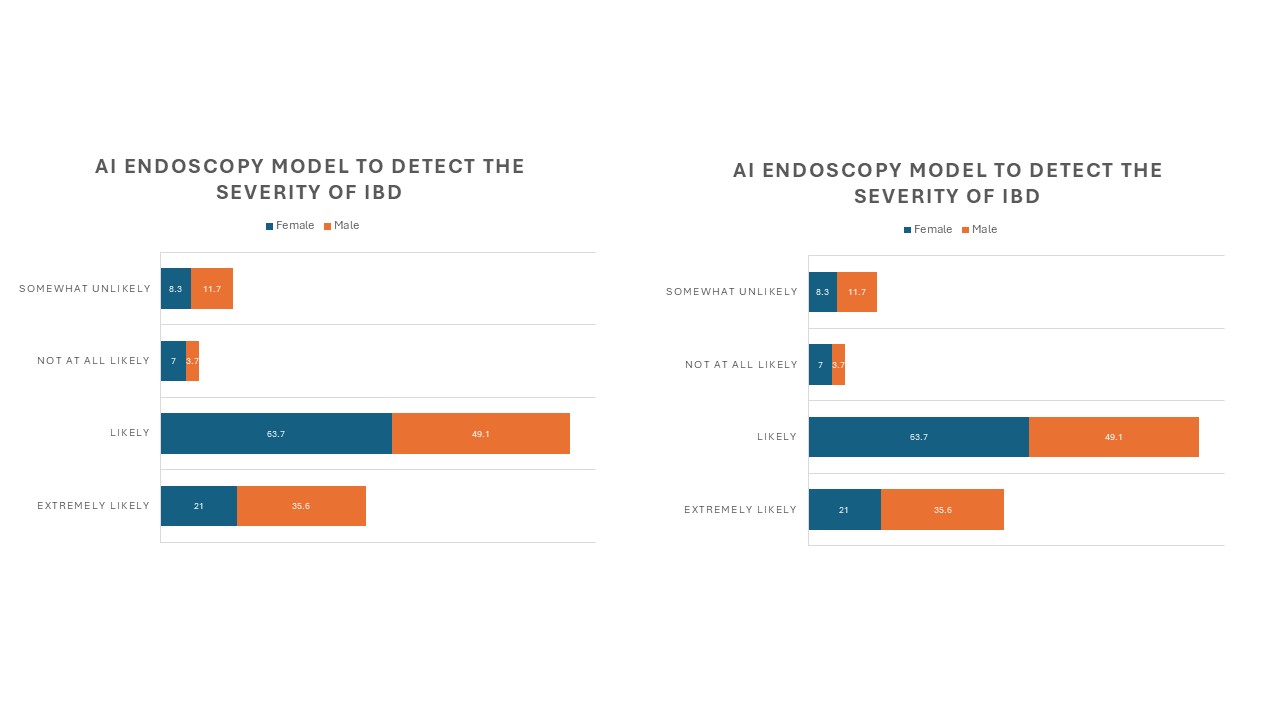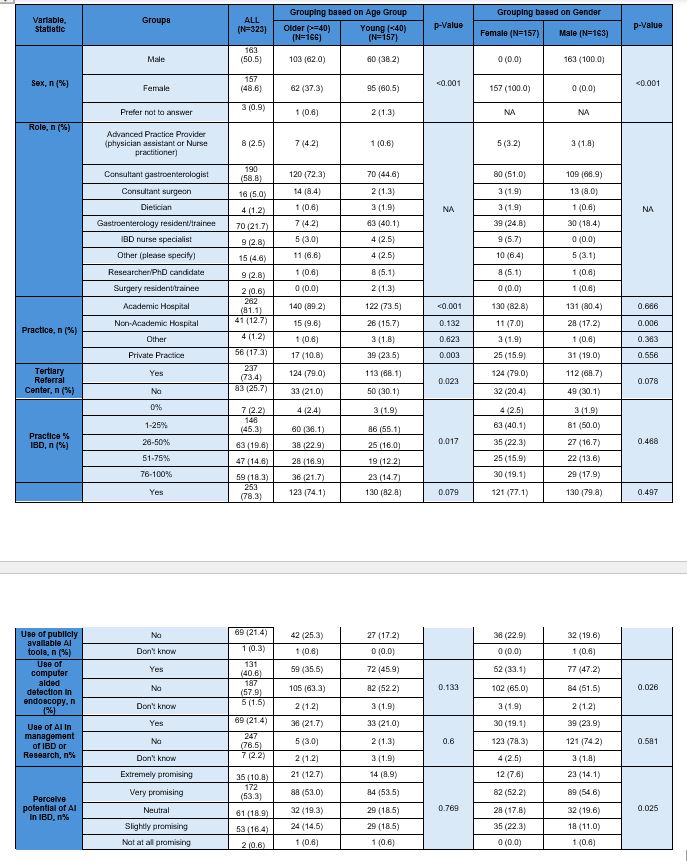Sunday Poster Session
Category: IBD
P1110 - Healthcare’s Providers Perspectives on the Role of Artificial Intelligence in the Care of Patients With IBD: Global Survey
Sunday, October 26, 2025
3:30 PM - 7:00 PM PDT
Location: Exhibit Hall

Jalpa Devi, MBBS
Washington University in Saint Louis
Saint Louis, MO
Presenting Author(s)
Jalpa Devi, MBBS1, Colleen Colbert, PhD2, Sophia Haroon. Dar, MD3, Beatriz Gros, MBBS4, Ashkan Rezazadeh Ardabili, MBBCh5, Agnes HY Ho, MBBCh6, Joseph Sleiman, MD7
1Washington University in Saint Louis, Saint Louis, MO; 2Cleveland Clinic, Saint Louis, MO; 3Southern Illinois University, Springfield, IL; 4Reina Sofia University Hospital, Saint Louis, MO; 55. Department of Gastroenterology and Hepatology, Maastricht University Medical Center, Maastricht, The Netherlands, Saint Louis, MO; 6The Chinese University of Hong Kong, Saint Louis, MO; 7Cleveland Clinic, Cleveland, OH
Introduction: Artificial intelligence (AI) is reshaping IBD care, yet real-world integration remains hindered by issues such as data quality, algorithmic bias, privacy concerns, and limited provider familiarity. Current literature offers limited insight into provider perspectives. This study aimed to assess global healthcare providers’ perceptions, usage patterns, and barriers to AI adoption in IBD care, as well as to identify demographic and practice factors linked to AI use and unmet clinical needs.
Methods: An anonymous 17-item survey was developed by an international team via an iterative process and pretested among 10 healthcare providers. Domains included clinical role and setting, IBD workload, AI use in endoscopy and research, attitudes toward AI utility, perceived barriers, and implementation priorities. The estimated completion time was 10 minutes. The IRB at Washington University in St. Louis deemed the study exempt. The survey was fielded globally from January to May 2025 via social media (e.g., X), international IBD newsletters (e.g., YOGI IBD, IBD Live, myUEG), and email listservs.
Results: A total of 323 respondents completed the survey, primarily from North America (35.3%) and Europe (26.0%), with 38.7% from other global regions. Most worked in academic hospitals (81.0%), with 73% characterized as IBD tertiary centers. The mean age was 42.7 years (±11.2), with a near-equal gender distribution. Most were gastroenterologists or surgeons (n=216, 66.8%), followed by trainees (n=72, 22.3%). While 78% reported using publicly available AI tools (e.g., ChatGPT), only 40.6% had used AI in endoscopy, and 21.4% in IBD-specific care or research. Male respondents were more likely to use AI tools and favor integration for endoscopy or imaging-based tools that assess IBD severity (p=0.009) or complications (p=0.02). Of the six ranked-choice questions about AI-based tools critically needed for current IBD practice, no tool was ranked significantly higher than the others, with an average rank of 3.31 (IQR 3.28–3.36) on a scale of 1 (most needed) to 6 (least needed).
Discussion: This international survey reveals strong interest in AI adoption for IBD care, though implementation remains limited. While sex-based differences in usage emerged, age was not a significant factor. Concerns about AI integration (noted by 55%) highlight the need for targeted education, system-level integration, and equitable implementation research.

Figure: AI Endoscopy model to detect the severity of IBD

Figure: Table 1 demographics
Disclosures:
Jalpa Devi indicated no relevant financial relationships.
Colleen Colbert indicated no relevant financial relationships.
Sophia Dar indicated no relevant financial relationships.
Beatriz Gros indicated no relevant financial relationships.
Ashkan Rezazadeh Ardabili indicated no relevant financial relationships.
Agnes HY Ho indicated no relevant financial relationships.
Joseph Sleiman indicated no relevant financial relationships.
Jalpa Devi, MBBS1, Colleen Colbert, PhD2, Sophia Haroon. Dar, MD3, Beatriz Gros, MBBS4, Ashkan Rezazadeh Ardabili, MBBCh5, Agnes HY Ho, MBBCh6, Joseph Sleiman, MD7. P1110 - Healthcare’s Providers Perspectives on the Role of Artificial Intelligence in the Care of Patients With IBD: Global Survey, ACG 2025 Annual Scientific Meeting Abstracts. Phoenix, AZ: American College of Gastroenterology.
1Washington University in Saint Louis, Saint Louis, MO; 2Cleveland Clinic, Saint Louis, MO; 3Southern Illinois University, Springfield, IL; 4Reina Sofia University Hospital, Saint Louis, MO; 55. Department of Gastroenterology and Hepatology, Maastricht University Medical Center, Maastricht, The Netherlands, Saint Louis, MO; 6The Chinese University of Hong Kong, Saint Louis, MO; 7Cleveland Clinic, Cleveland, OH
Introduction: Artificial intelligence (AI) is reshaping IBD care, yet real-world integration remains hindered by issues such as data quality, algorithmic bias, privacy concerns, and limited provider familiarity. Current literature offers limited insight into provider perspectives. This study aimed to assess global healthcare providers’ perceptions, usage patterns, and barriers to AI adoption in IBD care, as well as to identify demographic and practice factors linked to AI use and unmet clinical needs.
Methods: An anonymous 17-item survey was developed by an international team via an iterative process and pretested among 10 healthcare providers. Domains included clinical role and setting, IBD workload, AI use in endoscopy and research, attitudes toward AI utility, perceived barriers, and implementation priorities. The estimated completion time was 10 minutes. The IRB at Washington University in St. Louis deemed the study exempt. The survey was fielded globally from January to May 2025 via social media (e.g., X), international IBD newsletters (e.g., YOGI IBD, IBD Live, myUEG), and email listservs.
Results: A total of 323 respondents completed the survey, primarily from North America (35.3%) and Europe (26.0%), with 38.7% from other global regions. Most worked in academic hospitals (81.0%), with 73% characterized as IBD tertiary centers. The mean age was 42.7 years (±11.2), with a near-equal gender distribution. Most were gastroenterologists or surgeons (n=216, 66.8%), followed by trainees (n=72, 22.3%). While 78% reported using publicly available AI tools (e.g., ChatGPT), only 40.6% had used AI in endoscopy, and 21.4% in IBD-specific care or research. Male respondents were more likely to use AI tools and favor integration for endoscopy or imaging-based tools that assess IBD severity (p=0.009) or complications (p=0.02). Of the six ranked-choice questions about AI-based tools critically needed for current IBD practice, no tool was ranked significantly higher than the others, with an average rank of 3.31 (IQR 3.28–3.36) on a scale of 1 (most needed) to 6 (least needed).
Discussion: This international survey reveals strong interest in AI adoption for IBD care, though implementation remains limited. While sex-based differences in usage emerged, age was not a significant factor. Concerns about AI integration (noted by 55%) highlight the need for targeted education, system-level integration, and equitable implementation research.

Figure: AI Endoscopy model to detect the severity of IBD

Figure: Table 1 demographics
Disclosures:
Jalpa Devi indicated no relevant financial relationships.
Colleen Colbert indicated no relevant financial relationships.
Sophia Dar indicated no relevant financial relationships.
Beatriz Gros indicated no relevant financial relationships.
Ashkan Rezazadeh Ardabili indicated no relevant financial relationships.
Agnes HY Ho indicated no relevant financial relationships.
Joseph Sleiman indicated no relevant financial relationships.
Jalpa Devi, MBBS1, Colleen Colbert, PhD2, Sophia Haroon. Dar, MD3, Beatriz Gros, MBBS4, Ashkan Rezazadeh Ardabili, MBBCh5, Agnes HY Ho, MBBCh6, Joseph Sleiman, MD7. P1110 - Healthcare’s Providers Perspectives on the Role of Artificial Intelligence in the Care of Patients With IBD: Global Survey, ACG 2025 Annual Scientific Meeting Abstracts. Phoenix, AZ: American College of Gastroenterology.
